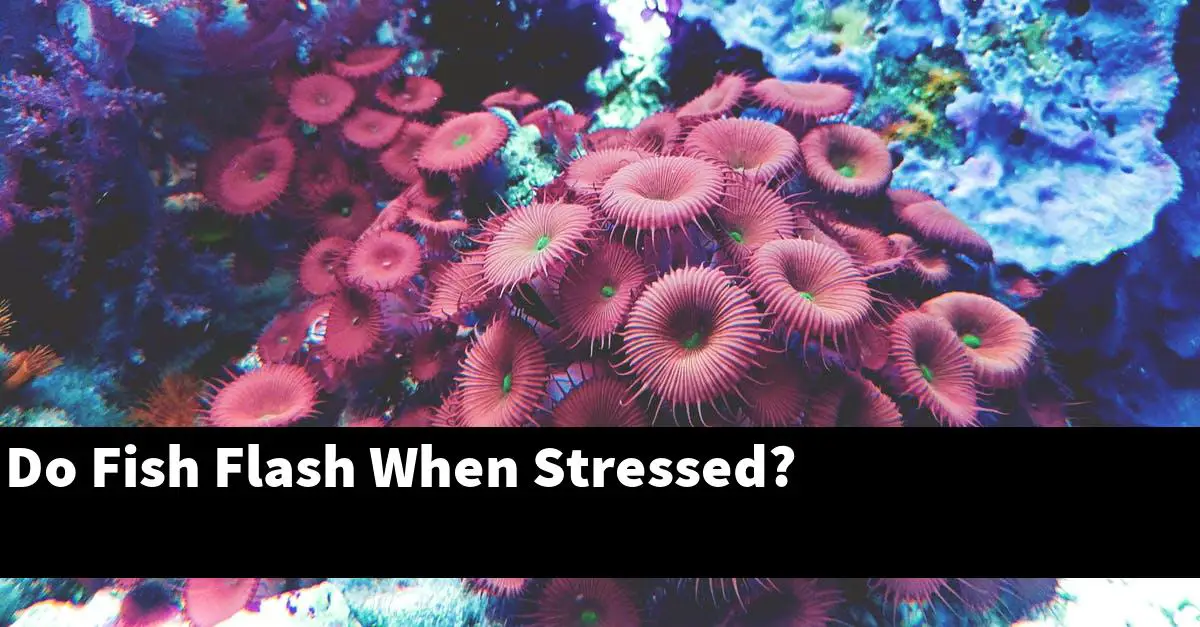Do fish flash when stressed? is a question that has been debated among scientists for many years. Some believe that fish do indeed flash when they are stressed, while others believe that this is simply a myth.
Fish bouncing on bottom of tank?
There are a few potential causes for a fish bouncing on the bottom of its tank. One possibility is that the fish is not getting enough oxygen.
If the fish is not getting enough oxygen, it will struggle to swim, and may even end up bouncing on the bottom of the tank. Another possibility is that the tank is not big enough for the fish.
If the tank is not big enough, the fish may be forced to swim in circles or swim to the bottom of the tank to find food.
Fish flashing after water change?
Fish flashing after water change is a common occurrence and is not necessarily indicative of any underlying problem. Flashing is simply a reflexive response of fish to water entering their gills.
Some fish may flash more than others and this may be indicative of some underlying problem. If the flashing is constant or severe, then it may be indicative of a problem and should be assessed by a veterinarian.
What does fish flashing look like?
Fish flashing is when a fish swims very quickly back and forth across the surface of the water. This is often seen when a fish is trying to escape from a predator or when it is excited.
How to treat stressed fish?
There are a few steps that can be taken in order to help treat stressed fish. The first step is to assess the overall condition of the fish, and figure out what is causing the stress.
Once the cause of the stress is identified, then steps can be taken to alleviate the condition.
One way to help reduce stress in fish is to provide them with a comfortable environment. This can involve creating a calm and quiet environment for the fish, and providing them with plenty of shelter and hiding places.
Additionally, providing the fish with food and water that is clean and free of pollutants can also help to reduce stress.
If the stress is due to a physical condition, then a veterinarian may need to be consulted in order to treat the fish. If the stress is due to a mental condition, then supplements or medication may need to be administered in order to help the fish relax.
Fish flicking no white spots?
Some fish, especially those kept in tanks with other fish, will flick their gills in a characteristic way to communicate with their tankmates. This habit is called “flicking.”
Some fish, especially those kept in tanks with other fish, will flick their gills in a characteristic way to communicate with their tankmates. This habit is called “flicking.”
In some cases, this action may result in the fish flicking white spots off of its body. This is not a sign of disease, but is simply a result of the fish’s gills being wet and the fish rubbing them together.
How do you calm a stressed fish?
There are a few ways to calm a stressed fish. One is to offer them some food.
Another is to give them some fresh water. Another is to give them some space.
Fish flashing after treatment?
There have been a few reports of fish flashing after treatment with, for example, an antibiotic. Flashing may be a sign of distress and can be caused by a number of things, including changes in water chemistry, stress from treatment, or illness.
If you notice flashing fish, it’s important to check in with your veterinarian to rule out any underlying problems.
Fish flashing in pond?
Fish flashing in pond is a common behavior exhibited by fish. The purpose of flashing is to communicate with other fish or predators.
Fish will flash when they are alarmed, when they are trying to attract a mate, or when they are trying to defend their territory.
How can you tell if a fish is stressed?
Stressed fish exhibit a wide range of symptoms, including:
1. Increased activity or erratic swimming
2. Reduced appetite
3. Increased respiration rate
4. Increased water temperature
5. Increased salinity
6. Increased water pH
7. Increased nitrate and phosphates levels
8. Increased fecal shedding
9. Change in coloration
10. Change in behavior
Do fish get light stressed?
Fish do not get light stressed the same way that people do. Although they may become disturbed in bright light, they are not as likely to experience the negative effects of light stress such as exhaustion, reduced food intake, and altered behavior.
How do you treat flashing fish?
Flashing fish is a common problem in aquaria. The fish rapidly swim back and forth across the aquarium glass, appearing to flash.
The flashing may be triggered by a change in light intensity, a predator or prey in the aquarium, or the movement of other fish in the tank.
The most common treatment for flashing fish is to remove the offending fish or group of fish and replace them with a different species of fish. This is often done by adding a new fish tank to the existing aquarium and moving the flashing fish into it.
Another option is to use a fish shock collar to temporarily stun the fish and then remove them.
Conclusion
There is evidence that fish do, in fact, flash when they are stressed. A study conducted in 2013 found that when fish were placed in a stressful situation, they would display a rapid change in coloration.
This change is thought to be an attempt by the fish to signal to others that they are in distress.


